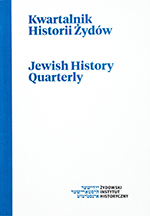Samorządowa polityka przyznawania subwencji wobec potrzeb żydowskich mieszkańców Krakowa (1918-1939)
Local Government Policy of Allocating Subsidies vs. the Needs of Jewish Inhabitants of Kraków (1918-1939)
Author(s): Hanna Kozińska-WittSubject(s): History, Local History / Microhistory
Published by: Żydowski Instytut Historyczny
Keywords: Kraków; inter-war period; municipal welfare policies; city subsidies
Summary/Abstract: The author analyses the welfare policy of the Kraków commune toward the Jewish inhabitants of the city and the Jewish community. She differentiates between two periods of the interwar years, the Great Depression being the dividing line. In the first, liberal, period the Jewish community was treated as an agency implementing the municipal welfare policy vis-á-vis the Jews. This translated into a continuation of the practices of Galician times, consisting in subsidizing the main Jewish community institutions, such as the hospital, the bathhouse, etc. When the crisis struck, the subsidies were severely cut or withdrawn altogether. During the latter period, the welfare activities of the Jewish communities were curtailed while the Jews did not come under the state welfare policy, which meant that this denomination was denied any welfare aid. The author also outlined the capital expenditures policies of the local government of Kraków’s Kazimierz district, whose population was predominantly Jewish.
Journal: Kwartalnik Historii Żydów
- Issue Year: 255/2015
- Issue No: 03
- Page Range: 413-445
- Page Count: 33
- Language: Polish
- Content File-PDF

